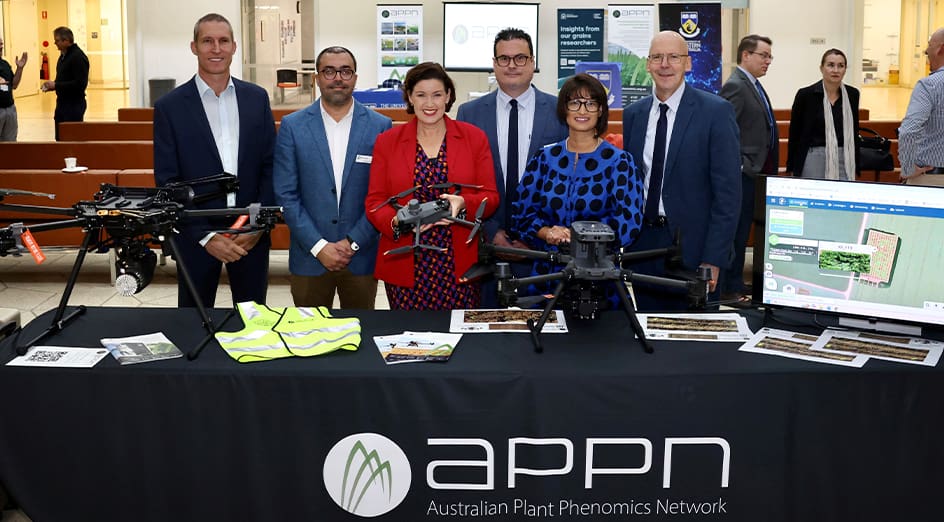
Peter Bird, GRDC, Dr Hammad Khan, DPIRD, Minister Jackie Jarvis, Dr Nic Taylor, UWA, Dr Parwinder Kaur, MLC, Richard Dickmann, APPN.
THE AUSTRALIAN Plant Phenomics Network (APPN) has launched two new Western Australian nodes as part of an innovative nation-wide plant phenotyping project designed to drive the growth of crops resilient to climate change.
Plant phenotyping is the assessment of complex plant traits including development, growth, resistance, tolerance, physiology, architecture, yield and ecology.
Digital plant phenotyping is an emerging scientific field that uses advanced sensors, robotics and data science to digitise, automate and analyse the labour-intensive research process.
The APPN WA initiative will enhance WA grain research by analysing large volumes of plant responses to soil, water, nutrients and light to help develop high performance grain varieties, backed by precise crop management.
WA’s nodes will be located at The University of Western Australia and the Department of Primary Industries and Regional Development’s (DPIRD) Northam and Merredin research facilities.
DPIRD’s node out of Northam offers the use of drones – known as uncrewed aerial vehicles or UAVs – equipped with state-of-the-art sensors, as well as mobile and ground-based instruments to monitor and measure crops.
The department’s Merredin Dryland Research Station will host sophisticated field trials with controlled irrigation and environmental monitoring, measured and monitored by the high-tech sensor systems.
Associate Professor Nic Taylor, director of the Australian Plant Phenomics Network node at UWA, said breeders and scientists would benefit from the experimental design, data acquisition and data analysis undertaken at the facility.
“Together with our research partners, we will help develop higher-yielding and more nutritious crop varieties that have a greater resilience to climate change,” Associate Professor Taylor said.
“It will enable the identification and isolation of desirable traits in new cultivars, often years faster than conventional breeding trials.”
Funding from the partners will provide more than $15 million over five years, to drive innovation through plant phenotyping.
A state-of-the-art digital phenotyping for controlled environments, including a dedicated extreme climate facility, and drone phenotyping will be funded at UWA.
UWA Centre for Water and Spatial Science co-director Associate Professor Nik Callow will lead the drone phenotyping field component that includes multispectral, hyperspectral and LiDAR drones and will also include ground-based robots and sensors.
“Drone pilots and data science staff will be able to go from paddock drone data collection to obtaining advanced data on plant traits across thousands of plots, transforming how we do agricultural research in WA,” Associate Professor Callow said.
WA Government Agriculture and Food Minister Jackie Jarvis said the investment will enable the grain’s industry to be “at the forefront of advances in research and WA’s growers to increase yields, quality and resilience”.
“Grains production is becoming increasingly reliant on data-driven science to breed improved varieties that are suited to local conditions,” Ms Jarvis said.
“Together with DPIRD’s research and development program throughout the Wheatbelt, the Cook Government is working alongside grower groups, universities and research collaborators to help WA growers optimise crop potential and adapt to market and climatic conditions.”
The new WA nodes are the result of a partnership between the Cook Government through DPIRD and the Department of Energy and Economic Diversification, and UWA.
The national network – backed by the Australian Government’s National Collaborative Research Infrastructure Strategy – incorporates other State nodes and investment by the Grains Research and Development Corporation.
Source: WA Government, UWA

HAVE YOUR SAY